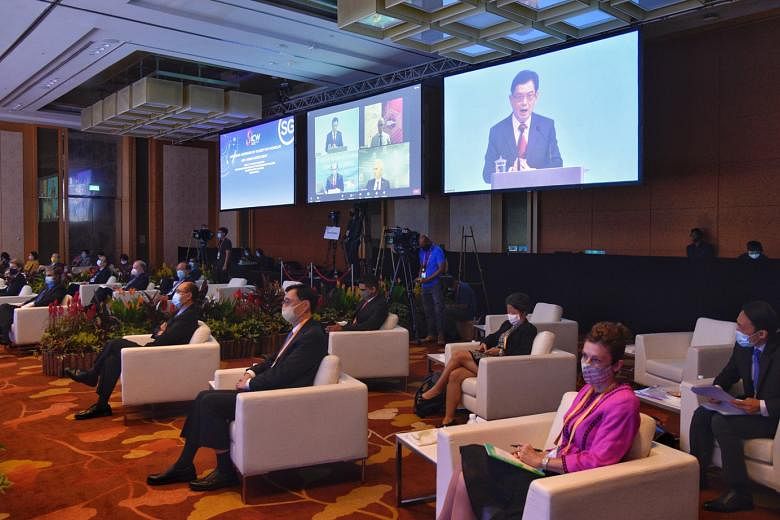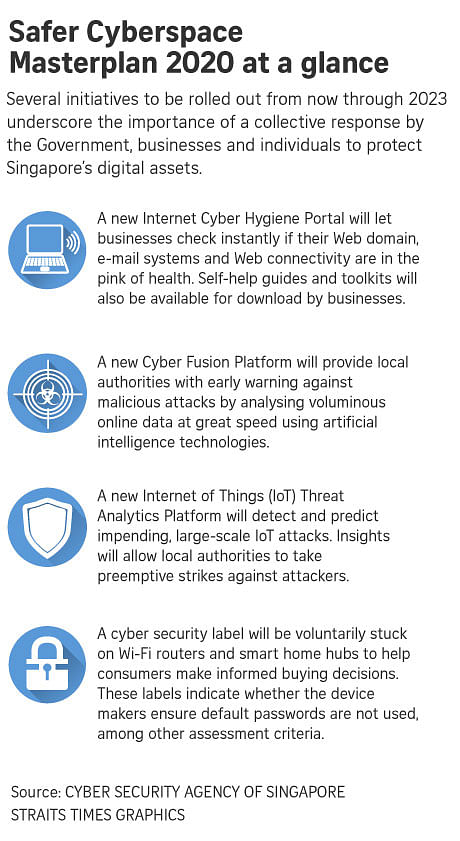Businesses in Singapore are set to benefit from free cyber-health screenings to spot weaknesses in their Web domains, e-mail systems and connectivity.
This is part of the newly unveiled Safer Cyberspace Masterplan 2020, which aims to protect Singapore's digital sphere.
The national plan also outlines the use of artificial intelligence (AI) to sniff out security threats in key infrastructure, including broadband and 5G networks, and consumer devices such as webcams and Wi-Fi routers.
Coordinated by the Cyber Security Agency (CSA) of Singapore, the masterplan is central to Singapore's plans to lead in AI and Smart Nation deployment globally, and comes amid the rapid digitalisation that has taken place in recent months.
"The pandemic accelerated the pace of change... Telecommuting, video calls, e-learning, online shopping and digital payment surged," said Deputy Prime Minister Heng Swee Keat when he unveiled the masterplan yesterday.
This means Singapore must redouble its efforts to fend off cyber threats, which are growing, said Mr Heng, who is also Minister for Finance, at the opening of the fifth annual Singapore International Cyber Week, which is a partially virtual event this year.
More than 9,400 cybercrime cases were reported last year, an increase of more than 50 per cent from the 6,200 cases reported in 2018, according to the Singapore Cyber Landscape 2019 report released in June by CSA.
Mr Heng urged the cyber security industry, businesses and individuals to do their part, noting that a secure cyberspace requires collective effort, with the masterplan being the Government's part.
The masterplan - which builds on Singapore's 2016 cyber security blueprint that included the roll-out of Internet surfing separation in the public sector - was first mentioned in Parliament in March.
CSA said yesterday that one of the key initiatives is to provide free cyber health screenings through a portal, which will be launched as early as next year.
Businesses will be able to check instantly if their Web domains, e-mail systems and Web connectivity are in the pink of health through the CSA-run Internet Cyber Hygiene Portal. Self-help guides and toolkits will also be available for download.
Also under the Masterplan, AI technologies will be powering two new systems - a Cyber Fusion Platform and an Internet of Things (IoT) Threat Analytics Platform - to defend the Republic's cyberspace against more persistent, sophisticated threats.
Greater use of AI to boost the nation's cyber defences is one of the nine key initiatives under Singapore's national AI plan, which was launched last November.
The Cyber Fusion Platform will provide CSA with early warning against malicious attacks by analysing voluminous online data at great speed.
Similarly, the Internet of Things or IoT Threat Analytics Platform will detect and predict impending, large-scale IoT attacks, thus allowing CSA and other government agencies to take pre-emptive strikes against attackers.
The two platforms could be launched as early as next year.
The IoT Threat Analytics Platform will complement an IoT label similar to the energy-efficiency labels on home appliances that help buyers of smart devices better judge how exposed they are to cyber risks.
This label, which is currently being rolled out, can be voluntarily pasted on Wi-Fi routers and smart home hubs, for a start. It will indicate if the device makers ensure that default passwords are not used, among other assessment criteria.
"Moving forward, we would like to work with other countries to establish mutual recognition for cyber security labelling and collectively advance the security standards of IoT devices worldwide," said Mr Heng, noting that tech firms have a "cyber duty of care" to their customers.
"Cooperation between countries, across businesses, and with our peoples will make all the difference as we build back better from Covid-19."



